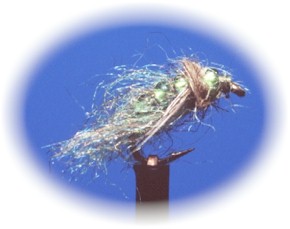|

|
Bead Rockworm
Here is another in our series of simple patterns. I first saw this pattern tied by Jim Pettis,
a Redding guide. The "rockworm" version is just one adaptation of this method of tying. In other words,
using different colored beads, different dubbing, and different hook styles and/or sizes, this same method can
be used to create a nearly infinite variety of imitations. This particular version is designed to suggest the small
free living Caddis which are typically found in the riverbed on freestone streams.
|
|
Instructions
1. Smash barb. Slip 4 or 5 beads onto hook.
2. Tie thread in about 1/8" behind eye, and build small thread ball there to keep front bead in place.
3. Cross thread over front bead and push this bead against the ball you just made. Now wind thread between first
and second bead to creat separation between them. Repeat this procedure with all beads, ending up with tying thread
at middle of hook bend.
4. Take some dubbing and spin it onto tying thread, keeping the fibers long. Begin winding the dubbing on behind
last bead, moving forward through all of the beads until you reach the front of the first bead. There stop dubbing
and place a few winds of thread to secure dubbing into place. Whip finish, but don’t cut the thread.
5. Take a "teasing" tool, such as hook end velcro strip glued onto a stick, and tease out the dubbing
so as to create a "halo" effect around the beads. If the dubbing looks too long, trim it to shape.
6. Using a small partridge or grouse feather, create a soft-hackle set of legs in front of the front bead, whip
finish, and cut thread. If done properly, and with a sparkly dubbing, the fly should look translucent and buggy.
It needs to be fished at or near the bottom, as these bugs sometimes "drift" either
willingly or unwillingly.
|

![]()

